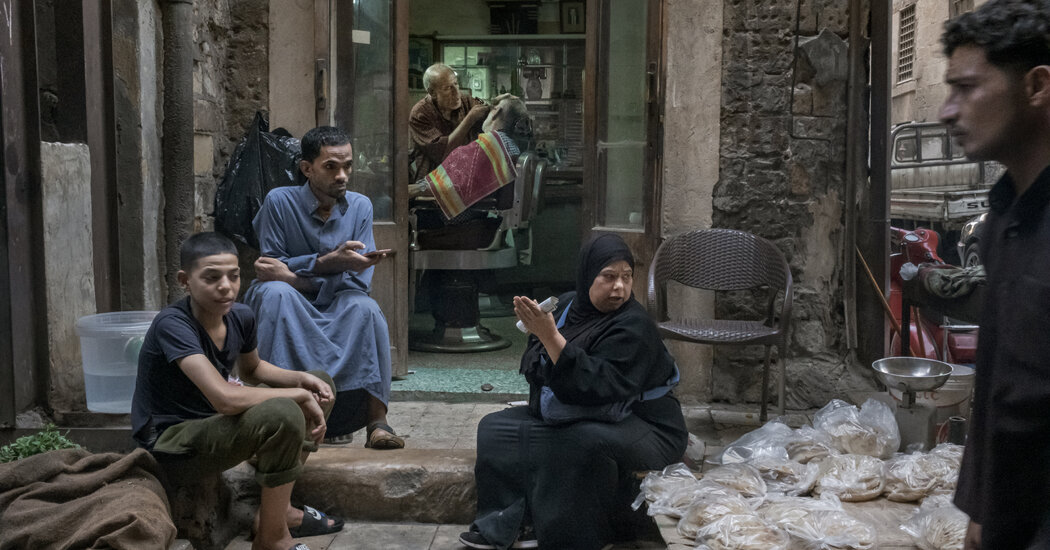When he returns to Cairo for a visit after 20 years in America, Masry, the main character of the classic Egyptian film “Bittersweet,” has to readjust to the daily indignities of life in Egypt all over again. But one of his biggest shocks comes when he goes to a government office for a new passport.
To process his application, the official in charge asks for “tea” with 100 spoonfuls of sugar, a request that mystifies Masry, until his friend explains that the official wants a bribe.
“Shall I help you,” the official says to the scandalized Masry, “or would you like to go to the back of the line with a ‘good conscience’?”
Handing over cash to skip a line for extra help or as a thank you is so taken for granted in Egypt that companies sometimes consider such “tips” a routine business expense. Parking valets, waiters, doormen and deliverymen get them, just as they might in other countries. But so do receptionists at private medical clinics, government clerks and even hospital nurses, some of whom request tips for tasks like bringing their patients water.
To anyone watching “Bittersweet” in Egypt in 2025, 15 years after its release, the size of the bribe is what sticks out.
In 2010, 100 Egyptian pounds was around $18. Today, several economic crises and currency devaluations later, Masry’s unpaid bribe would be worth only about $2.
Even that might be a stretch for middle-class or poor Egyptians now. Inflation has been stuck in the double digits since the country’s latest economic crisis started in early 2022, reaching a record high of 38 percent in September 2023.
Inflation declined to 11.7 percent last September, after Egypt received multi-billion-dollar bailouts from the International Monetary Fund, the United Arab Emirates and the European Union and moved to stabilize the economy.
But progress on economic reforms remains slow. And Egyptians are still raw from years of sacrifice, belt-tightening and deepening poverty.
“Inflation got to everything, even tips,” said Marina Kaldas, 29, a social media manager in Cairo. “In the past, people could pay 10 to 20 pounds, and it would be totally enough. But now if you paid someone just 10 pounds, he wouldn’t be able to do anything with it.”
When Ms. Kaldas’s father went to the hospital in March for kidney failure, she said, the nurses ignored his requests for water or for help changing his clothes until she began tipping them — an exasperating expense, even if it was only about $1 a day for each nurse.
Because of the economic situation, Ms. Kaldas said she had understood. “Low wages force people to rely on tips,” she said. “They need to have extra money.”
Tipping might be an ingrained habit in Egypt, but opinions vary widely about the appropriate time to give and whether payment for certain favors is a token of gratitude, or plain old bribery.
Two years ago, Ms. Kaldas found herself stuck in a long line at an office when she needed to renew her driver’s license in a hurry. While waiting, she saw others bribing a government employee to get their licenses without a driving test, she said.
Ms. Kaldas disapproved — what about road safety? — but she was not above tipping the same clerk after he allowed her to skip to the front of the line, giving him 1,000 pounds (about $33) to thank him on top of the regular fees, she said.
If the same thing happened today, she said she would have to tip him up to 1,800 pounds (about $38).
Higher tips are increasingly hard to afford for many Egyptians. Still, some see giving extra money as a religious duty or as an act of charity, a way of bridging the otherwise yawning gap between people with something to give and those with next to nothing.
Though Egypt says it has expanded welfare programs, the most recent official statistics, from 2019, estimated that just under 30 percent of Egyptians were living in poverty. With the coronavirus pandemic and the most recent economic downturn, the percentage has almost certainly risen. The government is also slashing bread, gas and electricity subsidies crucial to many poor Egyptians.
Mai Mohammed Sadek, an English teacher in Cairo, said she tried to give 10 to 15 pounds (about 20 to 30 cents) to parking valets and grocery store baggers, up from her usual five pounds before the economic crisis.
“It’s always been part of the culture, but maybe your intentions are a little bit different now,” she said. “You’re doing this because you know how hard it is, so you’re helping, instead of saying thank you.”
But regardless of the recipient’s need, she said it irritated her whenever she pulled into a public street parking spot and one of Cairo’s many self-appointed parking attendants suddenly materialized to “help” — then made clear, through body language or by wishing her happy holidays, that a tip was expected, even though she had found the spot and parked the car herself.
“Like, what did you do?” she said. “Nothing!”
Gifts that buy the tipper an advantage over others, such as permission to cut a line, also offended Ms. Sadek’s sense of fairness, she said.
For some who tip, however, such exchanges are the only lubricant for the squeaky, worn-down wheel of Egyptian life. And for those who receive them, collecting tips is a socially acceptable way to survive in a merciless economy.
Earlier this year, Amr Ahmed, 55, a computer technician in Cairo, was at a medical clinic so packed that he knew he would be waiting for hours for a doctor.
Sensing from the receptionist’s friendliness that he could help — for a price — Mr. Ahmed slipped him 50 pounds, or about $1, to secure an earlier appointment.
A few years ago, he might have given just five, he said.
“Sometimes you feel embarrassed when you pay so little, because you know how little it is,” he said. “When you give people money, you want to give them something they can appreciate.”
Vivian Yee is a Times reporter covering North Africa and the broader Middle East. She is based in Cairo.
Rania Khaled is a Times reporter and researcher based in Cairo.
The post The Economic Crisis in Egypt Raises Another Dilemma: Tipping appeared first on New York Times.




